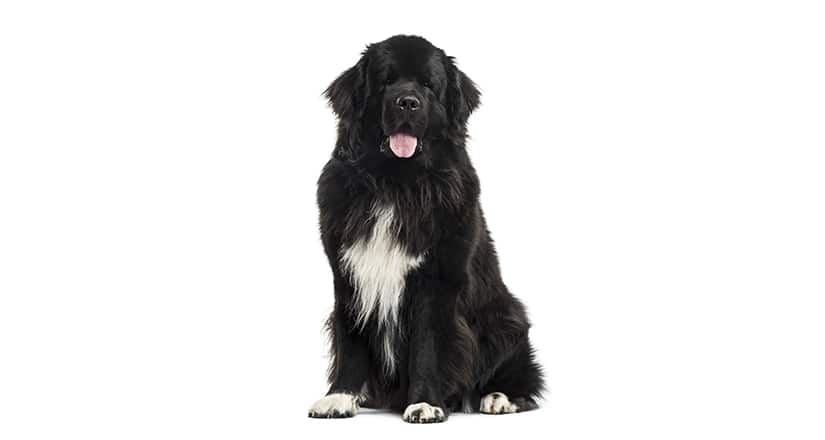The Newfoundland originated from Canada and is thought to have originated from the Great Pyrenees brought to Canada by fishermen in the 1700s. These dogs were used aboard ships and specialized in water rescues. This breed is thought to trace back to the Tibetan Mastiff.
The Newfoundland is an all-purpose water dog and fishing aid. Today’s function is as a water rescue dog. This breed is part of the AKC Working Group and the UKC Guardian Dog Group.

2 feet, 5 inches



Guardian Dog
Brief History
The Newfoundland, also known as Newfs, are strong swimmers and were bred as drafting and general working dogs on Newfoundland’s island. This breed was also used to help with towing lines and nets. Today, this breed is still considered the best water- rescue dog. The Newf is dedicated to humanity and to helping people.
Physical Description
This dog breed is super large and powerful. With a broad head and muzzle, large lips and muzzle, dark eyes, the Newfoundland has a relaxed long tail. The ears are natural drop ears. The double coat is thick and can be black, gray, or brown with or without white markings. The Landseer-type Newfie has a white coat with black markings. The Newfoundland is heavily boned yet well-balanced. This breed has superior life-saving qualities at home or in the water.
Temperament
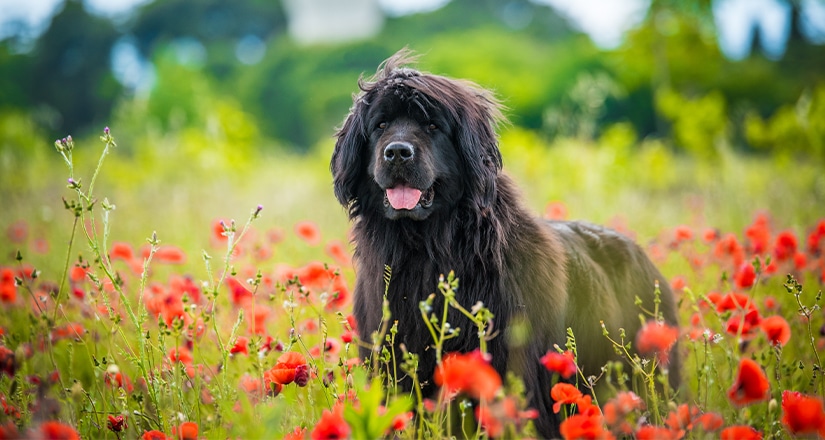
The Newfoundland is gentle, great with children, other dogs, and animals. This breed loves water and is recognized for its ability and willingness to save swimmers. The Newf is a devoted family companion and multipurpose dog. You will not find a sweeter, more evenly dispositioned dog breed with a heart of gold.
The Newfoundland is not a boring breed, nor is it ill-tempered. Like all dogs, the Newfie benefits from positive puppy training classes and socialization during puppyhood. The AKC describes the Newfoundland as “Sweetness of temperament is the hallmark of the Newfoundland; this is the most important single characteristic of the breed.”
Special Needs
Prospective pet parents to the Newfoundland need to consider their financial ability to meet giant-sized nutritional needs, positive training classes and supervised swimming for their Newts. Newfs do drool and enjoy making a huge mess with water when drinking. This calm and patient dog breed makes for a good family companion and is protective around family members.
The Newfoundland needs to go for long daily walks a few times a day. This breed needs to be socialized from puppyhood and should never be isolated from people. The Newf bonds closely with all family members, including children. Giant breeds should have the necessary space required to live comfortably.
While each dog will vary in grooming and exercise needs, giant breeds like the Newfoundland may have specific veterinary requirements. Exercise and grooming need to be met with giant breeds. This breed loves the water and should be supervised when in the water to accidentally hurt other swimmers. Puppies that will be trained for water work need to be introduced to the water by four months. Early socialization and positive dog training classes are necessary for this rugged yet friendly dog breed. This breed is easy to train and needs to be around people every day. The Newf needs lots of gentle dog training and guidance. This breed is gentle and sensitive.
Possible Health Concerns
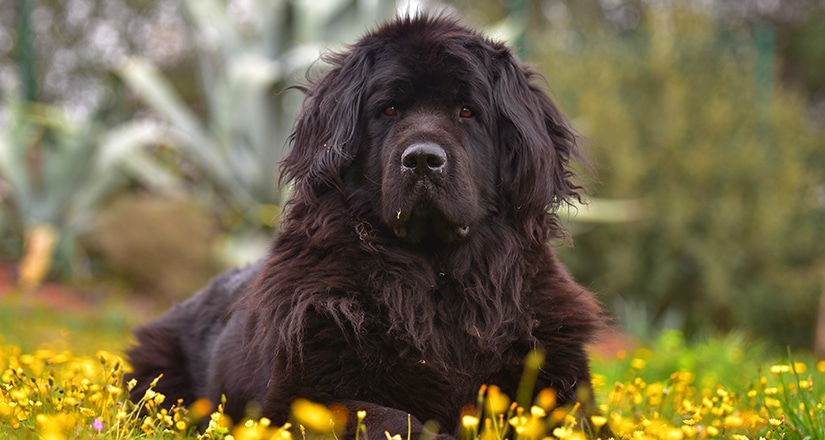
The Newfoundland is an active dog breed that may be susceptible to the following:
- Elbow and Hip Dysplasia: These are common developmental disorders of the hip and elbow joints. The Newfoundland has an increased risk of both hip and elbow dysplasia. It is an inherited disorder.
- Hypothyroidism: This occurs when there are decreased levels of thyroid hormones. Symptoms include hair loss, a dull coat, flaky skin with weight gain, and muscle loss. Consult with your veterinarian for advice if your Newf shows any of these symptoms.
- Cardiac Disease: Subaortic Disease (SAS) and congenital heart disease are two major heart diseases that affect the Newfoundland breed. Dilated cardiomyopathy also affects the Newf. As with any health concerns, it’s necessary to contact your veterinarian.
Exercise
The Newf enjoys both the water and land. This breed needs regular exercise every day. They enjoy being indoors with their humans but also need to participate in canine activities. The Newf loves swimming, long hikes in the woods, and frequent trips to the dog park or beach. This dog breed also enjoys swimming and pull and does well in cold weather.
The Newfoundland has also been known to enjoy carting and drafting. Newfs should participate in dock diving, agility, flyball, obedience work, rally, and tracking. Pet parents should try out numerous canine activities with their Newf to see which he prefers the most.
Nutrition
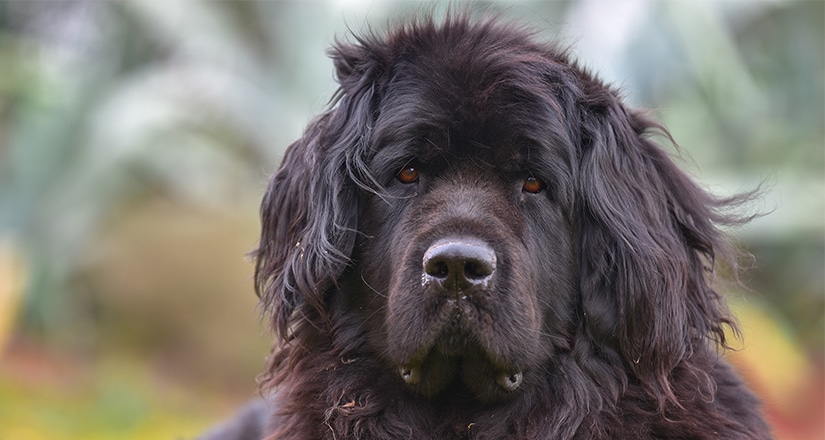
Some Newfoundland’s gain weight quickly and can become obese. Feeding this breed high-quality dog food, especially for giant breeds, is necessary. High-quality dog food for the appropriate life stage is recommended. Pet parents should never underestimate the importance of a well-balanced diet. That said, dog food that works for one dog may not work for another.
Newfoundland pet parents should assess their dog’s activity level, age, breed, and any medical conditions that he or she may be prone to. Consulting with your veterinarian about the best high-quality food options will help to give your dog a longer and healthier life! It will also help your dog live a longer life.
Providing your Newf with fresh fruits, salmon, chicken, vegetables, minerals, and fiber is a plus. Consider a high-quality, all-natural diet with no additives, no cheap fillers. Treats should be healthy and low fat to prevent obesity. This breed may be prone to bloat. To prevent bloat, it is important not to exercise vigorously close to mealtimes and provide your Newf with numerous smaller meals throughout the day.
Grooming
The Newfoundland has a heavy coat that needs daily maintenance. Slicker brushes and combs are recommended. Shedding will be heavier during the shedding season. Spayed and neutered Newfs will shed all year round, so daily grooming is required to remove dead hair and dirt. Weekly bathing is recommended, along with ear cleaning, teeth cleaning, and regular nail trimming. Long nails will cause discomfort and pain.
Adopting a Newfoundland
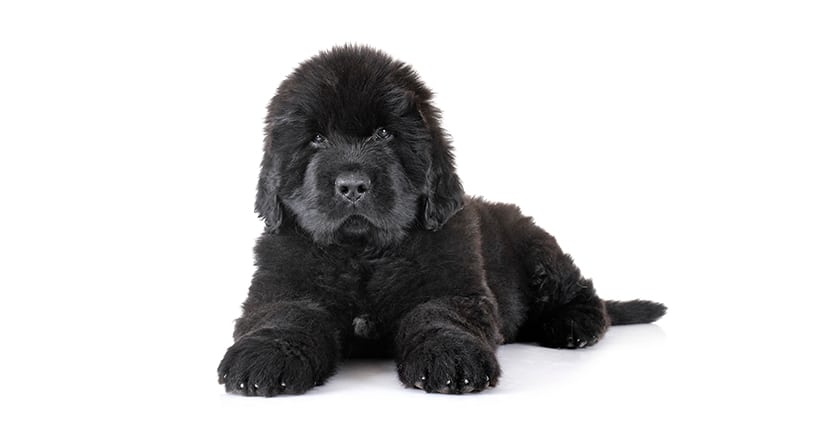
Keep in mind that when adopting Newfoundland, this breed may appear super large and heavy at the shelter. It’s best to take your time when making a decision and to visit the Newf rescue a few times at the top.
All Newfs will have huge personalities and are loyal companions. They may look straggly and messy at the shelter, but once correctly clipped and groomed, the Newf will look like he’s supposed to.
This adorable breed needs time to adjust to new surroundings and will be friendly and shy at first. It may take a few weeks for him to adapt, but once he’s settled down, there’s no turning back. He’ll be ready to go for that swim!
The Newfoundland makes for a wonderful adoption! As always, make sure that you’ve pet-proofed your home before welcoming your rescue home. There will be many areas of your home and garden that your new rescue will have access to! Keep him safe and happy!
Newfoundland Breeders in the USA
Kodiak Acres Newfoundlands (Connecticut)
- Address
- Bethany, CT
- Website
- www.kodiakacres.com
- Phone
- (203) 7454715
- kodiakacres@yahoo.com
Paramount Kennel (Connecticut)
- Address
- Ashford, CT
- Website
- www.paramountkennel.com
- Phone
- (860) 4630458
- jessthibault@live.com
Annisquam Light Newfoundlands (Massachusetts)
- Address
- Boxford, MA
- Website
- www.annisquamnewfs.com
- Phone
- (978) 8280194
- docsheri@msn.com
Mooncusser Newfoundlands (Massachusetts)
- Address
- Orleans, MA
- Website
- www.mooncussernewfoundlands.com
- Phone
- (508) 2552300
- suesnewf@juno.com
Southwind Newfoundlands (Massachusetts)
- Address
- Rehoboth, MA
- Website
- www.southwindnewfoundlands.com
- Phone
- (508) 2523948
- rseaman985@aol.com
South Shore Newfoundlands (New York State)
- Address
- Ontario, NY
- Website
- www.ssnewfoundlands.com
- Phone
- (585) 7471964
- ssnewfs@gmail.com
Avalon Bey Newfoundlands (North Carolina)
- Address
- Vale, NC
- Website
- www.avalonbeynewfoundlands.com
- Phone
- (704) 2763038
- catsquarerader@aol.com
Mountain to Sea (North Carolina)
- Address
- Monroe, NC
- Website
- www.mtntoseanewfoundlands.com
- Phone
- (828) 7753732
- dionne@mtntosea.com
Bear-Acres Kennel (Kentucky)
- Address
- Bedford, KY
- Website
- www.bear-acres.com
- Phone
- (502) 2559317
- bearacres@gmail.com
Belle Harbour Newfoundlands (Minnesota)
- Address
- Winnebago, MN
- Website
- www.bhnewfs.com
- Phone
- (507) 3991645
- dawn@bhnewfs.com
Furball Acres (South Carolina)
- Address
- Johnston, SC
- Website
- www.furballacres.com
- Phone
- (803) 2754306
- furballacres@nctv.com
Monark Puppies (Missouri)
- Address
- Neosho, MO
- Website
- www.monarkpuppies.com
- Phone
- (417) 4723628
- monark_puppies@yahoo.com
Breeders in the Canada
Homeport Kennel
- Address
- Mazerolle Settlement, New Brunswick
- Website
- www.homeportnewfoundlands.ca/main.html
- Phone
- (506) 4598348
- homeport@nbnet.nb.ca
Elevage Noir Et Blanc
- Address
- Sainte-Eulalie, Quebec
- Website
- www.elevagenoiretblanc.com
- Phone
- (819) 4708391
- dist.jmsjoy@xplornet.com
Arcadia Newfoundlands
- Address
- Eastman, Quebec
- Website
- www.arcadianewfs.com
- Phone
- (514) 8507397
- info@arcadianewfs.com
Sea Fever Newfoundlands
- Address
- Acton, Ontario
- Website
- www.seafevernewfs.ca
- Phone
- (905) 4643153
- info@seafevernewfs.ca
Ashmoor Newfoundlands
- Address
- Cobourg, Ontario
- Website
- www.ashmoornewfoundlands.ca
- Phone
- (905) 3771140
- jill@ashmoornewfoundlands.ca
Titanbear Newfoundlands
- Address
- Sturgeon County, Alberta
- Website
- www.titanbearnewfies.com
- Phone
- (780) 9212051
- kimgary@shaw.ca
